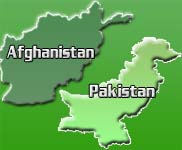How the Taliban has turned extortion into a gold mine
 Kabul - Creating an Islamic emirate and getting rid of all the infidels. Those are the declared goals of Afghanistan's Taliban militants.
Kabul - Creating an Islamic emirate and getting rid of all the infidels. Those are the declared goals of Afghanistan's Taliban militants.
The war of the self-styled religious warriors, who have been resisting tens of thousands of foreign solders, does not come cheap.
Afghanistan's private sector does its share to finance the insurgency - albeit not entirely voluntarily. Those who want to do business in the south have to pay protection money to the Taliban.
According to businessmen, even the international troops indirectly put money in the insurgents' war chest.
Afghan businessman Khalid Naderi, who did not give his real name, said he believes only a small percentage of the Taliban militants fight for ideological reasons.
"Everything has to do with money," said Naderi, who co-owns a telecommunications firm that operates in the restive south, where he pays 2,000 dollars in protection money per month for each of his transmission masts. "You have to do it. Everybody does."
If he didn't, his masts would be destroyed, he said. His company negotiates via middlemen, easily found in Kandahar in southern Afghanistan, with the Taliban based in Quetta in south-western Pakistan.
Quetta, according to not only the Afghan government but also Western experts, is the headquarters of the Taliban leadership council, a claim Islamabad denies.
A high-ranking officer of the Pakistani military intelligence service, Inter-Services Intelligence, recently told the German Press Agency dpa that while the so-called Quetta shura existed in the past, there were no longer any Taliban leaders in the city.
They were all in Afghanistan now, the official insisted.
Naderi has a different story. And according to information obtained by dpa, at least one German aid organization received its approval for an aid project in southern Afghanistan from Quetta. After the Taliban approval, the project has never been attacked.
The so-called Commission, a kind of shadow economics ministry of the militants, headed by Mullah Brader, a deputy of Taliban leader Mullah Omar, was based in Quetta, Naderi said.
Whoever wants to do business in southern Afghanistan has to obtain Commission approval. In most cases, this expensive business licence is nothing more than a phone number in Pakistan that can be called in case of trouble, Naderi said. Those problems would then be solved by the Taliban at the other end of the line.
"They make sure that your business is not being attacked," Naderi said.
He said he believes that every single one of the shadow provincial governors set up by the Taliban leadership council receives 50,000 to 60,000 dollars in protection money each month alone from the telecommunications sector, the largest legal growth market in Afghanistan.
But the Taliban also has even more important sources of income. According to UN calculations, the insurgents made 250 million to nearly half a billion dollars last year from drug production and trafficking.
Its second-largest source of money was financers from the Middle East, Naderi said. "And then it's the private sector, unfortunately," he added.
Within the private sector, there are also gradations, Naderi said. "Most of the money comes from logistics," he said, referring to Afghan businessmen paying to make sure supplies transported by them and paid for by the West arrive safely at the bases of foreign troops.
"The forces indirectly finance the Taliban," said Naderi, who was surrounded by other businessmen who nodded in agreement. Every single one had stories about how the Taliban is bringing in money.
This development is worrying for Western politicians. "The Taliban is not only a military danger but increasingly also an economic danger due to their involvement in organized crime," Peter Struck, a German lawmaker, said during a visit this week to Kabul.
According to Naderi, today's Taliban is different from the one that ruled Afghanistan until its ouster in a US-led invasion in late 2001. "They are a very different crowd," he said. "They are more business-type Taliban."
Their business has been going so well that the militants provide significantly better pay for their fighters than the Afghan government does for its police officers.
Naderi is one of those Afghans who, believing in the country's future, returned from Western exile. He is not happy paying money to the militants. In regions controlled by the Afghan security forces, he is not forced to pay, he said.
Naderi said it has been a grave mistake by the international community to neglect the training of the Afghan police.
"If the Afghan National Police had gotten the same training as the Afghan army, then we would be in a completely different situation now," he said. (dpa)